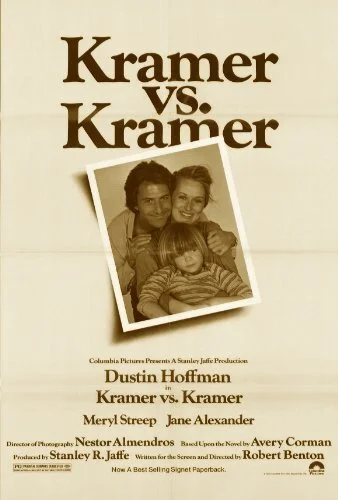Kramer vs. Kramer
This review is a part of the Best Picture Project: a review of every single Academy Award winner for the Best Picture category. Kramer vs. Kramer is the fifty second Best Picture winner at the 1979 Academy Awards.
When first released, Robert Benton's domestic legal drama Kramer vs. Kramer may have been a revelatory experience, with the severity of a broken marriage in full effect. Well, the main detail that separates this film from other similar works is just how sudden everything crashes Ted Kramer has no idea his wife Joanna wants to leave him. As the decision is so abrupt, Kramer vs. Kramer leaps into its life-post-split very quickly. Ted even banks on Joanna coming back, and his single parent gig will only be temporary.
Kramer vs. Kramer is comfortable enough with its characters and teachings to slink into a full on divorce debacle, and the transition is extremely smooth. We have enough information on either parent, and how this fiasco is affecting their son Billy. We also have to jump to a lot of conclusions surrounding Joanna, since she is missing in action for a good portion of the film. Kramer vs. Kramer is willing to get ugly, through it's legal battles, the parental shifts, and two former lovers going at each others' throats. The title refers to any Kramer battling any Kramer at any time, and not just the climactic court case.
The film features an acting showdown between Dustin Hoffman and Meryl Streep, either against each other, or in their own element.
Kramer vs. Kramer kind of has one goal, and it sticks with it: revealing new sides of parents and a child that thought they had each other (and themselves) all figured out. It's a success on that front. I also think trying to pull off any other sort of experiment would over crowd the film. Some premises don't allow for an overly complicated execution. This is one of them, and cutting down on any external subplots or ideas was wise. What we are left with is a relatively single note picture, but what a note it is. As an overall film, Kramer vs. Kramer is strong enough. As a legal narrative, one can certainly see why it has become a reference point for many others.
Although apparently not factual, according to lawyers that have debunked the film, Kramer vs. Kramer still remains a great build up to the inevitable trial, plus all of the scarring that happens when loved ones suddenly despise one another (especially in relation to the custody of a shared child). Mistakes become artifacts. Efforts become pointlessness. By the unexpectedly stunning ending, Kramer vs. Kramer is a reminder that life can break apart now, but it will keep going, and so shall we (even if we are going as a completely new being than before).
Andreas Babiolakis has a Masters degree in Film and Photography Preservation and Collections Management from Ryerson University, as well as a Bachelors degree in Cinema Studies from York University. His favourite times of year are the Criterion Collection flash sales and the annual Toronto International Film Festival.





